Charcoal powder—especially activated charcoal—has gained popularity as a natural alternative for teeth whitening. But is it actually safe? And does it really work?
In this article, we break down how charcoal powder works, its potential benefits, and the risks you should know before adding it to your oral care routine.
Key Takeaways
-
Charcoal powder, particularly activated charcoal, binds to stain molecules, offering a natural method for teeth whitening.
-
While effective for surface stains, charcoal powder lacks the deep whitening power of hydrogen peroxide and can be abrasive, potentially harming enamel with excessive use.
-
Customer experiences vary, with some users reporting quick results and freshness, while others find the application messy and question its overall value.
What Is Charcoal Powder for Teeth Whitening?
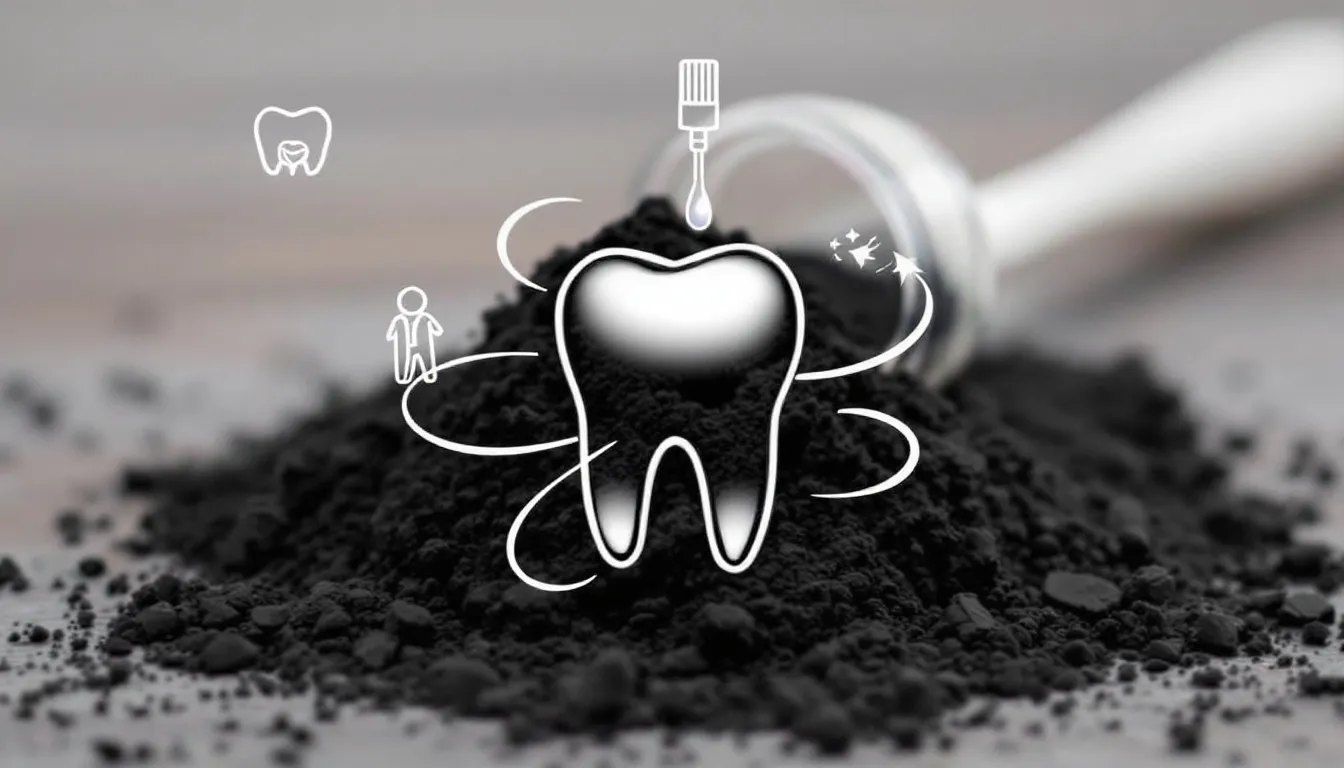
Charcoal powder for teeth whitening is made by heating natural materials—like coconut shells, wood, or olive pits—at high temperatures in a process called “activation.” This creates activated charcoal, a fine, porous black powder with powerful adsorptive properties. Unlike regular charcoal, activated charcoal has a high surface area that allows it to bind to stains, toxins, and odor-causing particles.
This binding ability is why activated charcoal has become a popular ingredient in natural teeth whitening products. It’s designed to lift surface stains caused by coffee, tea, red wine, and other daily habits—without the use of harsh chemicals.
Most charcoal powders used for oral care are food-grade and marketed as a cleaner, more holistic alternative to traditional peroxide-based whiteners. While it doesn’t penetrate enamel like hydrogen peroxide, it can still help remove external discoloration and improve the appearance of your smile.
Research has shown that charcoal powder can deliver similar surface-level whitening results to conventional whitening toothpaste. While both methods showed visible improvement in brightness and smoothness, there was no clear advantage between the two—highlighting that charcoal may be a viable option for those looking for a natural route.
How Does Charcoal Powder Whiten Teeth?
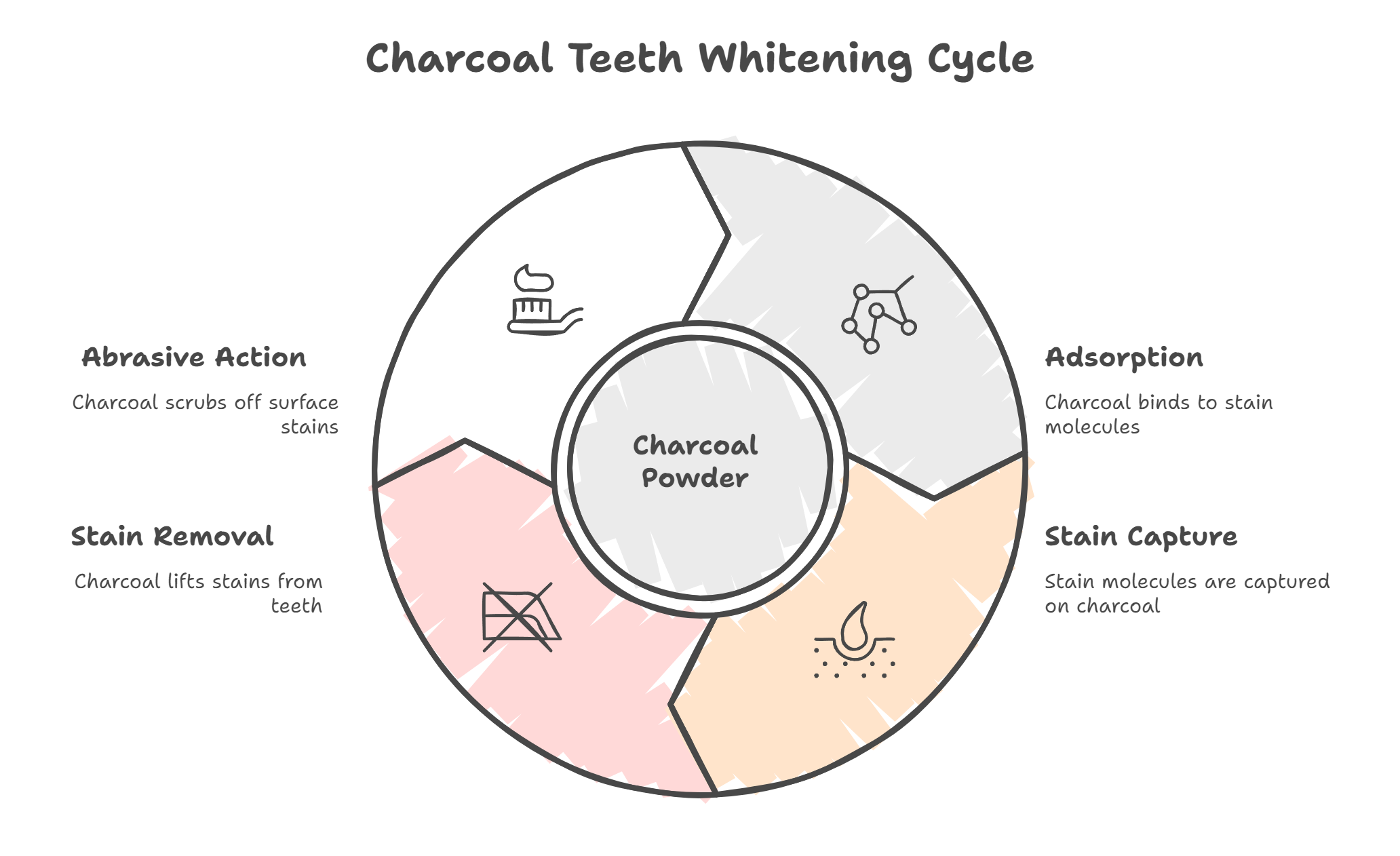
The magic behind charcoal powder’s ability to whiten teeth lies in its adsorption process:
-
Activated charcoal’s porous structure allows it to bind effectively to molecules responsible for staining, such as tannins found in beverages like coffee and red wine, as well as wine stains and coffee stains.
-
This binding process captures stain molecules on the surface of the charcoal.
-
The captured stain molecules are then removed from your teeth.
Moreover, the large surface area and porosity of charcoal powder enhance its ability to capture pigments and chromophores that cause discoloration. This means that when you brush your teeth with charcoal powder, it works to adsorb and lift away the substances that dull your smile.
In addition to its adsorptive properties, activated charcoal acts as a mild abrasive. This helps in scrubbing off surface stains, much like baking soda, giving you a whiter smile with regular use.
Benefits of Using Charcoal Powder for Teeth Whitening
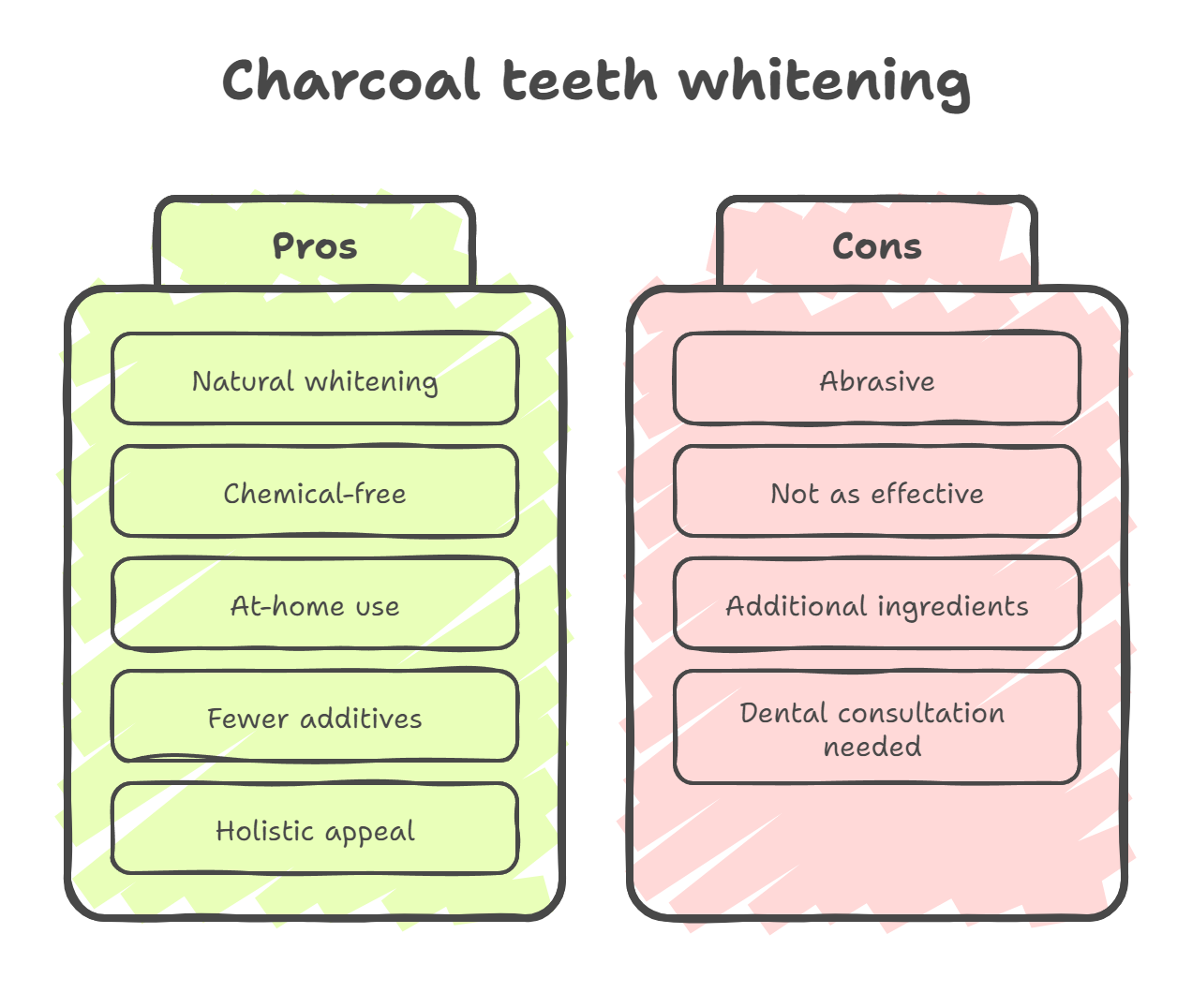
Many people choose charcoal powder because it offers a more natural approach to teeth whitening. While it may not deliver the deep bleaching effects of peroxide-based treatments, it comes with several benefits that appeal to users looking for gentler, chemical-free options.
Key Benefits of Charcoal Powder:
-
Natural whitening: Helps remove surface stains caused by coffee, tea, wine, and other foods using adsorption rather than harsh bleaching agents
-
Chemical-free option: Appeals to users seeking to avoid hydrogen peroxide and other synthetic ingredients
-
At-home convenience: Easy to use in your daily routine without the need for professional treatments
-
Fewer additives: Often contains minimal ingredients compared to commercial whitening products
-
Holistic appeal: Popular with individuals who follow natural or alternative wellness lifestyles
-
Affordable: Typically less expensive than professional whitening procedures
-
Mild freshness: Some users report a clean, fresh feeling after brushing
-
Customizable: Can be mixed into DIY whitening recipes using ingredients like coconut oil or baking soda
While charcoal powder and activated charcoal toothpaste may use similar ingredients, the latter often includes additional components. Dental professionals caution that some charcoal toothpastes can be abrasive, so it's best to consult a dentist before choosing the right product for your enamel type.
How to Use Charcoal Powder for Teeth Whitening
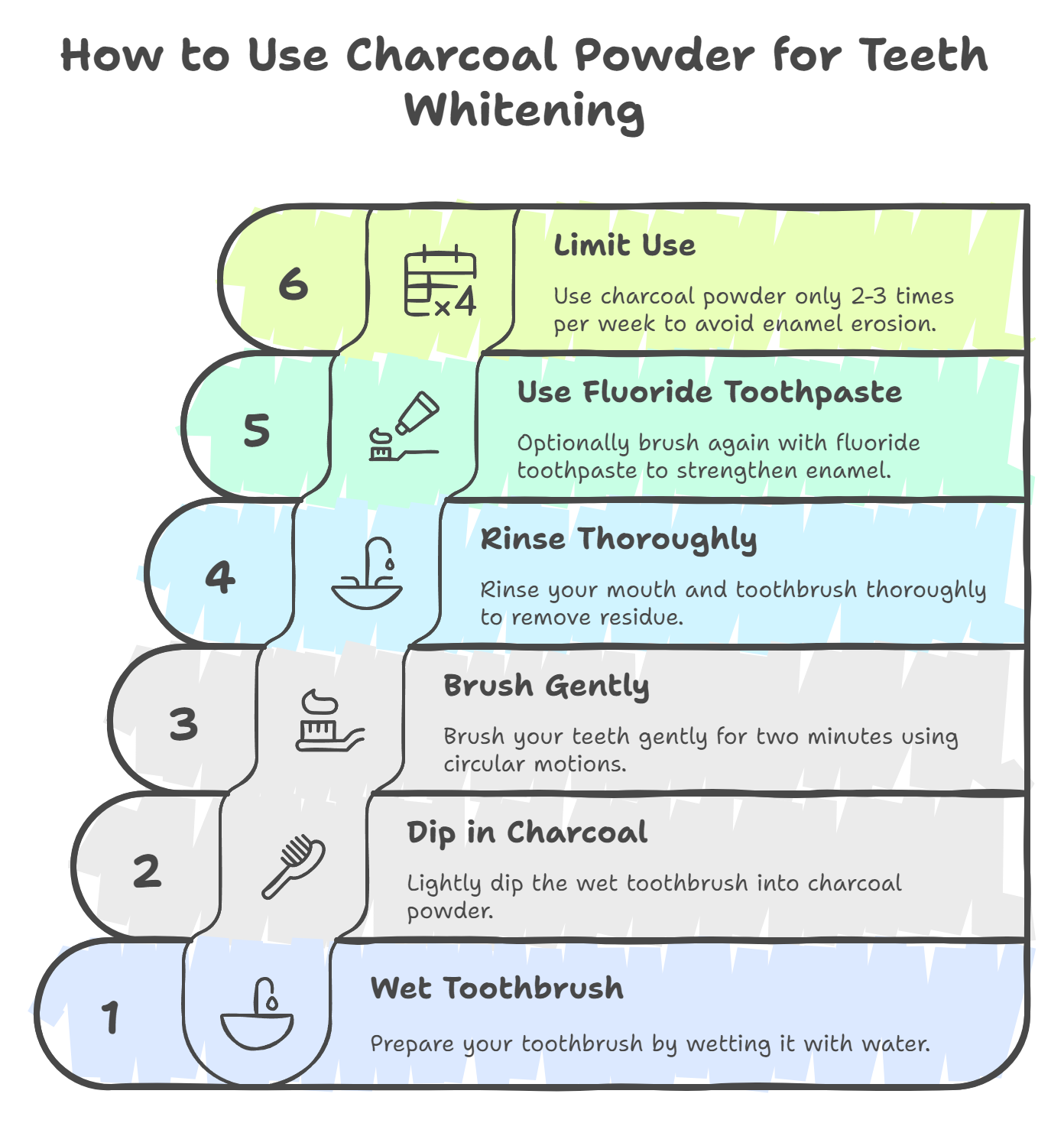
Using charcoal powder as part of your teeth whitening routine is simple, but technique matters to get results without harming your tooth enamel. Follow these steps for safe and effective use:
1. Wet your toothbrush
Use a soft-bristled toothbrush to minimize enamel wear.
2. Dip into the charcoal powder
Lightly dip the bristles into your charcoal teeth whitening powder. A pea-sized amount is enough.
3. Brush gently for 2 minutes
Use light pressure and small circular motions. Avoid aggressive scrubbing—charcoal is mildly abrasive.
4. Rinse thoroughly
After brushing, rinse your mouth and toothbrush well to remove all residue.
5. Follow with fluoride toothpaste (optional)
To help strengthen enamel, consider brushing again with a fluoride toothpaste after using charcoal powder.
6. Use 2–3 times per week max
Daily use may increase the risk of enamel erosion. Limit use to a few times a week for safer whitening.
Tip: The American Dental Association recommends being cautious with abrasive products. Always monitor your enamel and consult your dentist if you experience sensitivity or gum irritation.
Types of Charcoal Powder for Teeth Whitening
There are various types of charcoal powders available for teeth whitening, each with its unique properties. Bamboo charcoal is known for its high absorptive properties, making it effective in removing stains and impurities from teeth.
Coconut shells-derived charcoal is another popular choice. Its natural composition and minimal processing are believed to enhance its whitening effects, making it a favorite among those seeking natural products for natural teeth whitening solutions, especially when combined with wood.
Activated charcoal is often preferred for teeth whitening because of its fine particles and ability to bind to toxins and stains. These activated charcoal teeth whitening options offer certain types of charcoal powders for users to choose based on their preferences and needs.
Comparing Charcoal Powder with Other Teeth Whitening Methods
When comparing charcoal powder to other teeth whitening methods, it’s essential to consider the effectiveness and safety of each option. Studies have shown no significant difference in stain removal effectiveness between charcoal whitening dentifrices and non-charcoal alternatives. Furthermore, the American Dental Association does not recognize activated charcoal products as effective for teeth whitening due to a lack of scientific evidence supporting their claims.
Hydrogen peroxide is known for its effectiveness in breaking down chromogens, which leads to a more pronounced whitening effect compared to charcoal powder. Commercial whitening toothpastes often contain hydrogen peroxide and other agents that offer faster results.
Unlike charcoal powder, hydrogen peroxide can penetrate the enamel and dentin layers, providing a deeper whitening effect. However, charcoal powder may be more beneficial for tackling surface stains rather than deeper discoloration, which often requires professional dental treatments.
Pairing charcoal powder with enamel-safe whitening products can enhance results. This combination can help you achieve a brighter smile while preserving your enamel.
Potential Risks and Side Effects
While charcoal powder offers several benefits, it’s important to be aware of potential risks and side effects. Scientific evidence supporting the stain removal claims of charcoal-based whitening products mainly highlights their abrasive effects rather than their adsorptive properties. Researchers have also found that activated charcoal products can lead to thinning enamel with continued use, emphasizing the need for caution and moderation.
Regular use of charcoal powder can lead to increased surface roughness of teeth, which may negatively impact enamel integrity over time. Charcoal toothpaste might be too abrasive for regular use, potentially leading to enamel wear and making teeth appear more yellow as the underlying dentin is exposed. Excessive abrasion from charcoal products can also irritate the gums and potentially contribute to gum disease if not used properly.
Most charcoal toothpaste lacks fluoride, a key component that strengthens enamel and helps prevent cavities. While some users experience no gum sensitivity issues with the product, others report that it can lead to discomfort in their teeth and gums.
Avoid using charcoal powder if you have sensitive teeth or compromised enamel without consulting a dentist. Long-term safety effects of charcoal toothpaste are still not well understood, prompting caution from dental professionals regarding its use. Additionally, it is important to note that activated charcoal is not approved for teeth whitening by the U.S. Food and Drug Administration, which raises questions about its efficacy and safety.
Oral Care and Hygiene
Good oral care and hygiene are the foundation of a brighter smile and healthy teeth. Brushing your teeth at least twice a day with a fluoride toothpaste, flossing daily, and scheduling regular visits to your dentist are essential steps in preventing dental problems and maintaining fresh breath. For those interested in natural products, activated charcoal toothpastes and powders can be a helpful addition to your routine, as they may help remove surface stains and whiten teeth. However, activated charcoal products may not be appropriate for use in children and people who are pregnant or breastfeeding, so consulting a dentist is recommended.
However, it’s important to remember that while activated charcoal can contribute to a whiter smile, it should not replace your regular toothpaste—especially since most charcoal products do not contain fluoride, which is vital for strengthening enamel and preventing cavities. The American Dental Association (ADA) recommends choosing toothpastes with the ADA Seal of Acceptance, ensuring the product meets safety and effectiveness standards. If you have sensitive gums or teeth, consult your dentist before adding charcoal products to your regimen.
By combining activated charcoal with daily brushing, flossing, and professional dental care, you can help keep your teeth and gums healthy while working toward a brighter, more confident smile.
Tips for Maximizing Results
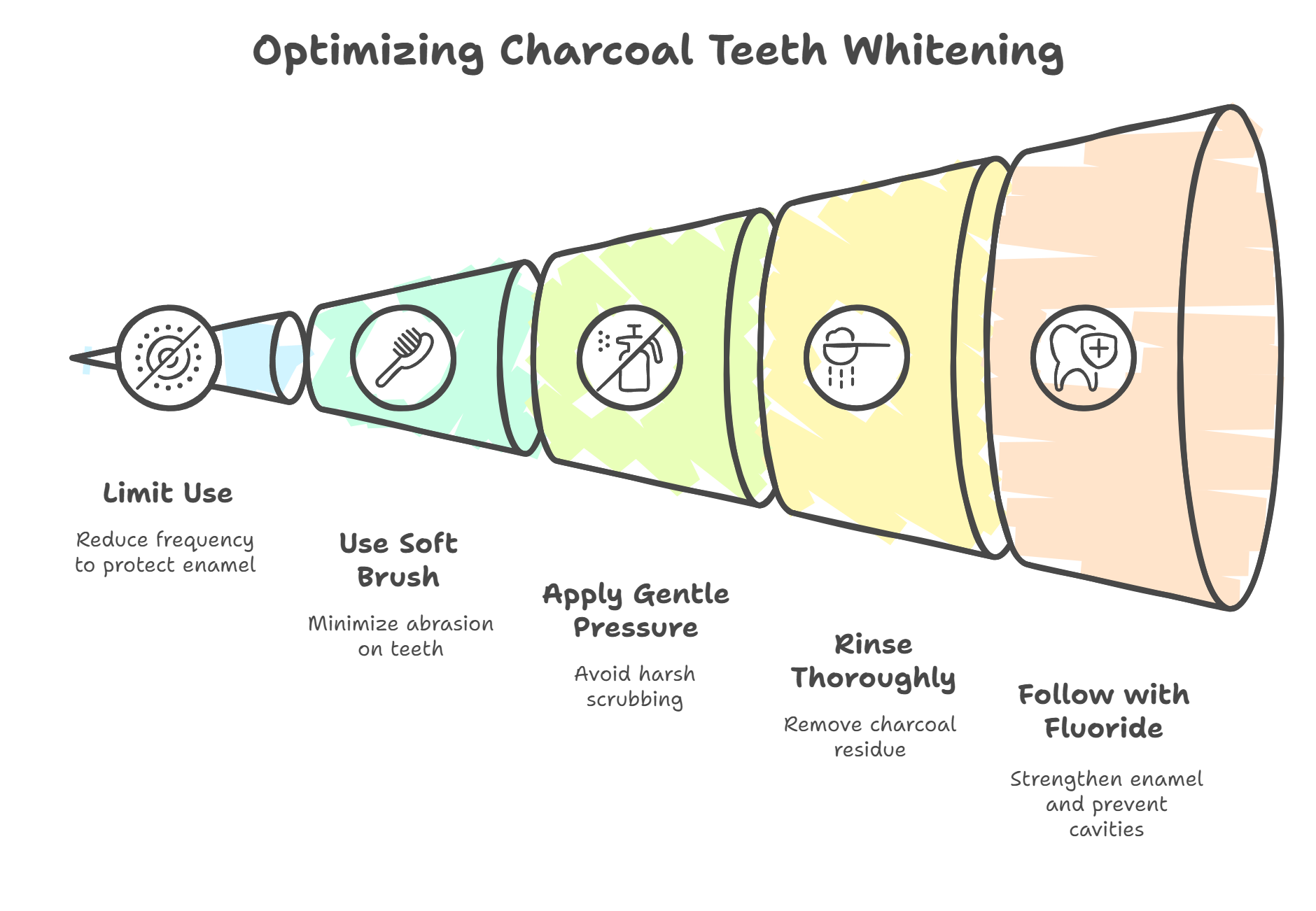
Want to get the most out of your charcoal teeth whitening routine? These simple tips can help you improve effectiveness while protecting your tooth enamel.
-
Limit use to 2–3 times per week: Daily use can wear down enamel over time. Stick to a few times a week to stay safe and still see results.
-
Use a soft-bristled toothbrush: This minimizes abrasion and helps protect both your enamel and gum tissue.
-
Apply gentle pressure: Avoid scrubbing. Let the powder do the work—harsh brushing increases the risk of tooth sensitivity.
-
Always rinse thoroughly: Charcoal residue can build up on gums or in crevices. Rinse your mouth and brush well after each use.
-
Follow up with fluoride toothpaste: Charcoal doesn’t contain fluoride, so brushing afterward can help strengthen tooth enamel and prevent cavities.
-
Use charcoal to freshen breath: Many users find that charcoal’s adsorptive qualities help reduce odors and keep breath feeling clean.
DIY Charcoal Toothpaste Recipe
Why not try making your own charcoal toothpaste at home? It’s simple and allows you to control the ingredients. Start with 2 teaspoons of melted cold-pressed organic coconut oil to create a smooth paste.
To prepare the mixture:
-
Mix in a small spoon of activated charcoal powder.
-
You can also add a pinch of baking soda for extra whitening power.
-
Add a drop or two of peppermint essential oil for a refreshing taste.
-
Stir well until all ingredients are thoroughly combined.
Store the mixture in a small container and use it as you would any other toothpaste. This DIY recipe provides a natural and effective way to whiten your teeth without the need for commercial products.
Customer Reviews and Experiences
While charcoal powder has its place in natural oral care, results can vary—some users report a noticeably brighter smile after just a few uses, while others find it messy or underwhelming in value.
That said, for those seeking whitening results with less mess and more consistency, many customers turn to SNOW’s whitening products—even though SNOW doesn’t currently offer an activated charcoal option. Here's what real users have to say:
"Stains are GONE!"
"I bought it a month before my wedding... My teeth are at least a few shades whiter and they look great!"
— Jennifer P. | Verified Purchase
"The Best Products!"
"I love this and even my dentist and dental hygienist asked me what I use to whiten my teeth. They said they were very impressed."
— Alexander R. | Verified Purchase
"Terrific Products"
"Really love SNOW! So easy to use."
— Maria S. | Verified Purchase
"I Am Impressed"
"Beautiful products! My teeth are at least 5 shades whiter and they look great!"
— Cathalina A. | Verified Purchase
By offering pro-level results without harsh ingredients, SNOW continues to be a trusted choice for users looking to safely and effectively brighten their smiles.
Charcoal Powder For Teeth Wrapped Up
In conclusion, charcoal powder can be an effective natural alternative for teeth whitening, offering a holistic approach to oral care. Its ability to adsorb surface stains and its mild abrasive properties contribute to a brighter smile.
However, it’s important to be aware of potential risks, such as enamel wear and lack of fluoride, which are critical for maintaining dental health. Consulting with a dentist before starting any new whitening regimen is always a good idea.
Ultimately, while charcoal powder has its benefits, it should be used with caution and in conjunction with other oral care practices to ensure a healthy and confident smile.
Future of Charcoal Teeth Whitening
The future of charcoal teeth whitening is bright, with many brands continuing to develop innovative activated charcoal toothpastes and powders that promise to whiten teeth and support oral health. As interest in natural teeth whitening grows, consumers are seeking products that deliver a brighter smile without harsh chemicals. While some early studies suggest activated charcoal may help remove certain types of stains, more scientific evidence is needed to fully understand its long-term benefits and limitations.
As the market expands, we can expect to see even more options for natural teeth whitening, including new formulations and improved delivery methods. However, it’s important to approach these products with a balanced perspective—prioritizing proven oral care habits like regular brushing, flossing, and dental check-ups alongside any whitening treatments. By combining the potential benefits of activated charcoal with a solid dental care routine, you can work toward a whiter, healthier, and more confident smile.
Remember, while many brands offer charcoal teeth whitening products, not all are created equal. Look for those backed by scientific evidence and consider consulting your dentist to find the best approach for your unique needs. With the right combination of natural products and good oral hygiene, achieving a brighter smile is within reach.
Charcoal Powder For Teeth Wrapped Up
In conclusion, charcoal powder can be an effective natural alternative for teeth whitening, offering a holistic approach to oral care. Its ability to adsorb surface stains and its mild abrasive properties contribute to a brighter smile.
However, it’s important to be aware of potential risks, such as enamel wear and lack of fluoride, which are critical for maintaining dental health. Consulting with a dentist before starting any new whitening regimen is always a good idea.
Ultimately, while charcoal powder has its benefits, it should be used with caution and in conjunction with other oral care practices to ensure a healthy and confident smile.
If you’re looking for a cleaner, safer, and more effective way to whiten, charcoal might not be the ideal solution long-term.
Want effective whitening without the mess? Try SNOW’s dentist-designed kits.
Frequently Asked Questions
Is powdered charcoal good for your teeth?
Powdered charcoal can help remove surface stains and promote a brighter smile, but it should be used with caution due to its abrasive nature, which can wear down enamel if overused.
Is it OK to brush teeth with charcoal powder?
Yes, brushing teeth with charcoal powder is generally safe when done gently and in moderation. Use a soft-bristled toothbrush and avoid excessive pressure to protect your enamel.
Does charcoal powder actually whiten teeth?
Charcoal powder can whiten teeth by adsorbing surface stains caused by foods and drinks like coffee and tea, but it is less effective on deep stains compared to professional whitening treatments.
How often should you use activated charcoal on your teeth?
For best results and to protect your enamel, use activated charcoal on your teeth a few times a week rather than daily, balancing whitening benefits with enamel safety.



































































